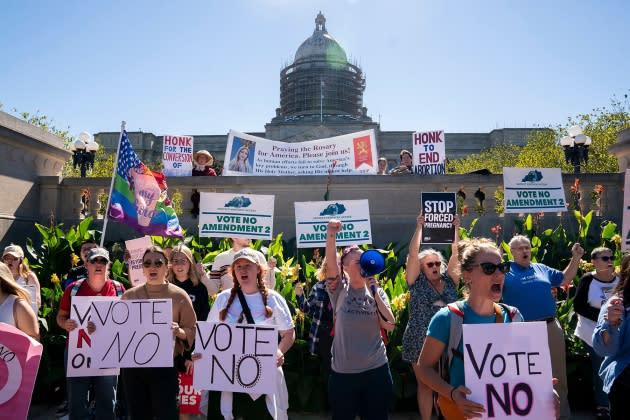The Architect of Kansas’ Abortion Win Is Taking on Kentucky’s Ban
- Oops!Something went wrong.Please try again later.

Except for what she describes as two “tours” of Washington D.C. — the first as an intern-turned-staffer in Mitch McConnell’s Senate office, and later as a political appointee to George W. Bush’s USDA — Dawn Riley has spent her entire life in Kentucky. She has also always been pro-choice: in the ‘90s, between stints in the capital, she managed the congressional campaign for a moderate Republican who made reproductive rights a central argument for her candidacy.
Last week, Riley co-hosted a fundraiser for Protect Kentucky Access, the coalition working to defeat a ballot initiative, like the one recently voted down in Kansas, that would strip the right to abortion from Kentucky’s constitution. “I’m stunned that we even have to have this conversation again,” Riley says of abortion rights. “It’s really mind-blowing.”
More from Rolling Stone
Protect Kentucky Access is marshaling supporters like Riley, who identifies as an independent, as they make the argument that the ballot initiative will usher in a dangerous, dystopian reality for women across the commonwealth. In some ways, it has been easier for organizers to make that argument in Kentucky than it was in Kansas, because in Kentucky abortion is already illegal.
“We are hearing, all across the state, that people are being taken right up to the line of sepsis for miscarriage care, or pharmacists are afraid to provide any medication that is included in a medication abortion regimen,” says Tamarra Wieder, director of Planned Parenthood Alliance Advocates of Kentucky. “The chilling effect has been profound here in Kentucky.”
When the Supreme Court struck down federal protections for abortion in June, Kentucky became one of the first states where abortion was outlawed, thanks to a trigger law designed to take effect instantaneously. Medical providers have filed a legal challenge against both the trigger ban and a six-week abortion ban, but Kentucky’s Supreme Court will not hear arguments until after voters weigh in on amendment 2 — and only if the amendment is defeated.
“We know that if this amendment passes there is no legal pathway to challenge any of these restrictions, and they become permanent,” Rachel Sweet, the campaign director for Protect Kentucky Access, says. For the last two years, Sweet was the director for Kansans for Constitutional Freedom, the group that organized against that state’s anti-abortion amendment; last month, she relocated to Kentucky to try to replicate their success.
Sweet sees an advantage in the state’s voter rolls: unlike Kansas, where registered Republicans outnumbered registered Democrats by a margin of roughly two-to-one, in Kentucky, voter registrations for Republicans and Democrats are closer to equal.
Both campaigns for and against the Kansas amendment were well-organized and well-funded, but in Kentucky, the political coalition Sweet inherited — of national partners like the ACLU and Planned Parenthood, along with local groups like Sister Song, Kentucky Health Justice Network, and Granny’s Birth Initiative — is out-raising its opponent significantly.
Protect Kentucky Access has raked in $2.7 million so far, five times more than its rival, Yes for Life. The vast majority of the $510,000 Yes for Life has raised to date has come from the Kentucky Baptist Convention. The Family Foundation Of Kentucky and the Catholic Conference of Kentucky have also made large contributions, but the campaign’s financial disclosures show surprisingly few small-dollar donations from individual supporters.
“There’s a lot of assumptions that Kentucky is pro-life based on our legislature,” Wieder says. But Democrats actually held a majority in the state house in Kentucky up until 2017 — the year Donald Trump was sworn into office. It was only at the start of that legislative cycle, Wieder says, “when we saw this onslaught of anti-abortion bills.”
Those new laws are now complicating the administration of health care in a state where it was already hard to access in many places: More than half the counties in the commonwealth do not have a practicing OB-GYN, 40 percent do not have a pediatrician.
Today, Wieder says, doctors are being forced to devise contingency plans with their pregnant patients for they can get get care, in case of miscarriage or medical complications. “Conversations about having a backup doctor in Illinois, or ‘Can you get to Indiana?’ …even if [patients] aren’t seeking abortion care, but they need a plan B for anything that may arise in their pregnancy.”
Dismantling Kentucky’s anti-abortion infrastructure will start with defeating the amendment, but it is not the only race advocates are concerned about this November. Joseph Fischer, a Republican state representative and the architect of both the trigger ban and the legislation that put amendment 2 on the ballot while in the Kentucky House, is now vying for a seat on the state’s supreme court. If elected to the position, he could wield even greater power to influence the administration of the state’s abortion laws. “I believe we’re going to win in November on the amendment,” Wieder says, “But if we have extremists like Jeff Fischer on the Supreme Court, we’re in trouble long term.”
Riley is likewise optimistic that voters in Kentucky will see the amendment for what it is: “another showing of the Republicans in Frankfort doing a power grab.” And even in Mitch McConnell’s home state, she says, “I feel like the overreach from the Supreme Court that’s trickled down has just been enough for people.”
More and more, she says, she’s hearing from “college friends and even family members who are just like, ‘This is crazy. This is just not what the government needs to be doing.’”
Best of Rolling Stone
